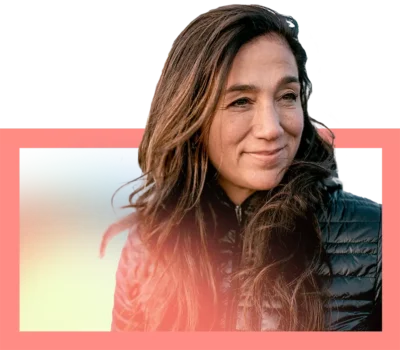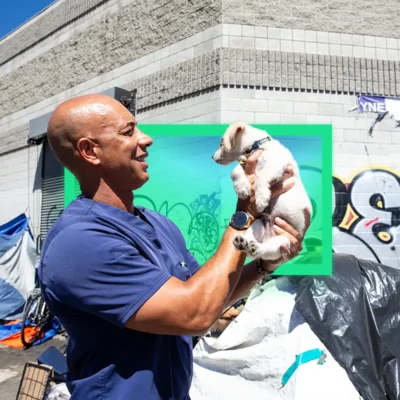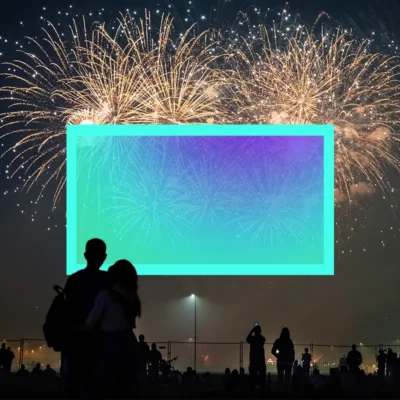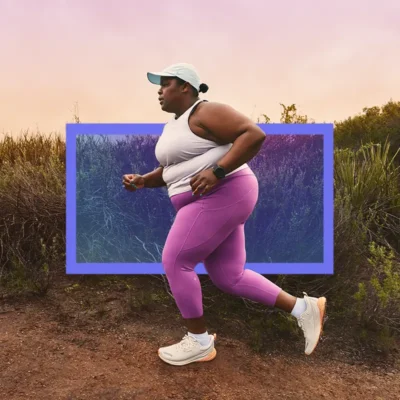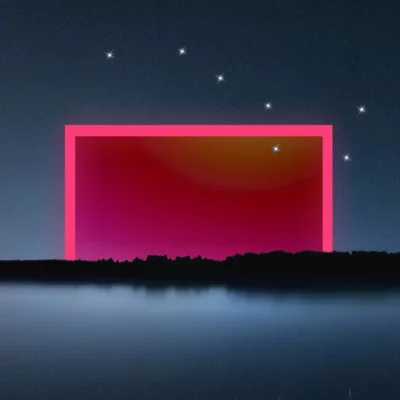When the sharks start to circle
When life is overwhelming, sometimes the smallest action — even one that seems insignificant in the moment — is what helps us move forward. Cristina Mittermeier is a nature photographer and adventurer who’s used to navigating treacherous situations in the name of protecting the climate. But when her life takes an unexpected turn, she learns how to take small steps forward to begin unlocking her power.
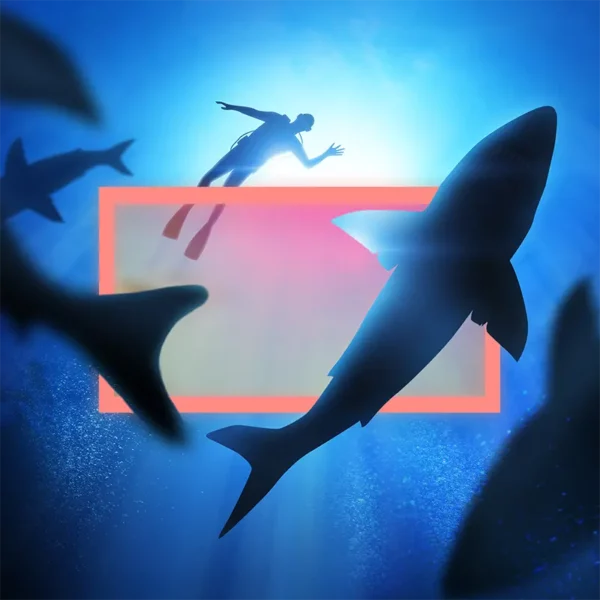
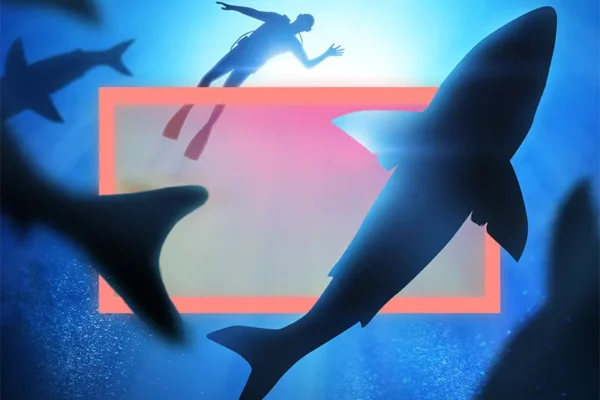
Table of Contents:
Transcript:
When the sharks start to circle
CRISTINA MITTERMEIER: As I dive further below the surface, checking my tank to make sure I have enough air, I start snapping photos. I’m drifting alone in the strong current. As I drift, I manage to photograph a massive whale shark swimming just below me. I come up into the blustery air and see no boat. I’ve drifted farther than I realized. This is very bad.
ROHAN GUNATILLAKE: Cristina Mittermeier is an adventurer. As an award-winning photojournalist, activist, and conservationist, she spends her days traveling the world bringing attention to the very real threats facing our oceans and the indigenous communities that rely on them. In this week’s story, Cristina shows us the importance of taking action in the face of injustice, even when things get scary. Or perhaps, especially when things get scary.
In this series, we combine immersive first-person stories, breathtaking music, and mindfulness prompts so that we may see our lives reflected back to us in other people’s stories. And that can lead to improvements in our own inner lives.
From WaitWhat, this is Meditative Story. I’m Rohan, and I’ll be your guide.
The body relaxed. The body breathing. Your senses open. Your mind open. Meeting the world.
MITTERMEIER: I feel the warm sunlight on my skin as I walk down the steps of my high school and into the busy courtyard. I hear the birds singing in the trees. My classmates playing basketball on the blacktop. The smell of tropical flowers lingers in the air. I take a deep breath.
My hometown of Cuernavaca, Mexico is called the city of ever-spring. My mother jokes that if you throw away a broomstick it will bloom because the weather is always perfect. Today is no exception.
Across the common yard separating my high school from the town’s elementary school, I see my 7-year-old sister, René, walking towards me. She’s upset. Fighting back tears. Her face red with effort. I instinctively rush towards her.
René hugs me hard. Her wet tears are warm against my shirt. “What is it?” I ask. “What’s wrong?” A boy in her class has been making fun of her for having trouble spelling her name. My sister has dyslexia and is left-handed. Even holding crayons is hard for her because her teachers keep telling her to use her right hand.
I feel anger rise inside of me. I take her hand and we march over to where the boy is playing with his friends. I point my finger. Raise my voice. I’m towering over him. I’m fifteen, and he’s only six.
“If you ever give her a hard time again, you will have to answer to me!” I shout and storm off, just in time to see his face crumple as he begins to cry.
Afterwards, I feel terrible. I feel like I’ve become the bully. I’m just so angry. Not at the kid. I’m angry at my sister’s pain. Angry at the injustice of it. When something seems unfair or wrong, it’s like the world is off kilter, and I need to fix it. It’s what I always do. I speak up for classmates who can’t defend themselves. I use my voice to stand up for others more than I use it to stand up for myself. I don’t know where this impulse comes from. It’s just who I am. I’m the older sister. Oldest of four. I’m the protector.
Growing up in Latin America, I’m immersed in the cult of the hero. The liberator. The one who stands up to powerful forces and rights the biggest wrongs. That’s who I want to be. For my sisters. For my friends. For the whole world.
Through my closed bedroom door, I hear the sound of my parents arguing. My father’s voice rises in anger. He has a terrible temper. And it’s worse now that he drinks more. I’m embarrassed because they’re arguing about me. I’m graduating from high school soon and I want to attend university in the fall to study marine biology and engineering.
I’ve always loved nature. Our house in Cuernavaca is surrounded by large fields. Goats, chickens, and cows roam freely. I spend most of my childhood playing outside, observing the wildlife, going on adventures with kids from the city’s largely indigenous community. I’m aware of humanity’s impact on the environment. I see that our oceans are at risk. And I want to get the degrees I need to do something about it.
My father disagrees. He wants me to be an accountant like him. “How will she make a living? Biologists starve!” he bellows. My shoulders tense.
On my desk, beneath a pile of unfinished math homework, I see my cherished copy of The Living Sea by Captain Jacques Cousteau. I’m reminded of being nine years old, stealing this book from my brother’s bedroom. My father had given it to him as a present. I, on the other hand, had gotten Barbie coloring books. I have no interest in clothes or dolls. I never have. But my father is very traditional. He expects me to grow up, marry, and stay home. He doesn’t see me for who I really am and what I want.
My mother is my champion. I hear her make my case as my father slams the door to their bedroom. She understands how much an education means to me because of how much it means to her. She has a PhD and her own psychology practice. Dad resents her degrees. It comes out as meanness.
My greatest fear is that my father will force me to stay. That he won’t let me study what I want or pursue everything I want to do in this world. I’m grateful for my mom because the thought of confronting him myself is overwhelming. I have a paralyzing aversion to personal conflict. When he gets angry, I just want to be invisible. I want so badly to break away and have my own life. But I can’t speak up for myself.
There are things that scare me about going, too. University is far away in Sonora. I don’t know anybody there. What if the classes are too hard? What if I fail? What if my parents’ sacrifice is for nothing?
I push my math homework to the side and look down at the worn cover of ‘The Living Sea.’ At the picture of the little submarine above the coral reef. The deep, spectacular blue water that surrounds it. I remember the story of Captain Cousteau and his boat, The Calypso. The pod of sperm whales it follows. The vastness of our beautiful planet.
That’s what I want: Adventure on the high seas. And a chance to make a difference. There are many injustices I need to fight. I want my life to have consequences. I want a legacy. I feel a greater purpose to serve the whole world, and holding on to that makes me feel brave.
GUNATILLAKE: There was a real tension in Cristina’s shoulders when her father shouted. If there is any in yours, let it soften. And now feel the solidity and uprightness — in your body if you like — of Cristina’s determination here and clear direction.
MITTERMEIER: The warm water rushes up the beach, over my bare feet and up my legs. The Caribbean Sea stretches out in front of me all the way to the horizon. Behind me, the sun has set. I’ve been on the Yucatan Peninsula for a few weeks. I’m just out of college and here for my first real job as a biologist: Inventorying wildlife near a hotel so the owner can establish a nature preserve. It’s nothing glamorous, but I get to work on my own and dive whenever I want. I immerse myself in the environment and follow my passion. Which brings me to this beach, alone, late at night.
Sea turtles come here to lay their eggs at night. But every morning the tides come in and flood the nests, or raccoons come down from the trees to dig up the eggs. I know that if no one does anything, the sea turtles will be in a lot of trouble.
So I do something. I walk the beach at night and mark the nests with sticks. Then, in the morning, I dig up the new eggs and move them up the beach to safety. They’re so small and vulnerable. It’s not fair that the world is changing around them. Just like when I stood up for my sister in high school, I feel the need to stand up for the sea turtles.
With my flashlight in one hand, I find a recently dug nest. I hear a rustling in the tree line and quickly shine my light in that direction. I don’t see anything. But my heart is pounding.
It’s not safe for me to be out here by myself. Another girl from the hotel was recently attacked on a nearby trail. I usually try to bring a friend with me or some hotel guests that are interested in learning about the turtles’ plight. But tonight, I am alone. Fear rises up in my stomach, but my determination to help these turtles is stronger. I take a breath. I return my focus to protecting nests. To my larger goal.
This pattern plays out again and again in my life. I speak up for the animals. I speak up for nature. Even if it’s scary. I can’t wait for someone else to act. It’s too important. The problem is too big. Any fear I have feels small in comparison.
Then there comes a day when my fear doesn’t feel small at all. I’m partly sitting, partly lying down on the hard floor of an apartment in [Cristina, where was the apartment?]. I’m 45 years old, and all alone. There’s not a stick of furniture in the place, only a bare lightbulb blotting out the dark. My three kids are with their dad, who until recently was my husband of 20 years. The marriage didn’t end in a fight. We sat down and divided our belongings. But my husband was very paternalistic. Now that I’m on my own, I realize I don’t know anything about supporting myself or managing my finances. I don’t know how to pay taxes. I don’t even have my own bank account.
My circumstances feel overwhelming. My loneliness is all-consuming. How am I going to take care of myself? How do I get back on my feet? Who am I now that I’m divorced? None of these questions have clear answers. This terrifies me.
Tears stream down my face and my heart physically aches. I can’t believe that this is what has fully knocked me off my feet. I think of myself as a courageous person. My work as a biologist has led me to work in conservation and wildlife photography. I travel all over the world, sometimes alone, taking photographs of rainforests, wild animals, and indigenous people at risk of losing their communities. I regularly put myself in unfamiliar, uncomfortable, and sometimes terrifying situations, all in the name of documenting and protecting the planet. I conquer fear to do what I love.
But tonight, none of that seems to matter. Not my grand acts of bravery. Not my heroic ideas about fighting injustice. None of that is going to help me pick up the pieces of my own life. This isn’t a global problem, it’s deeply personal to me. I’m not saving the planet. I’m saving myself. I’m not sure that’s something I know how to do.
Fear is a paralyzing emotion. And I can feel myself becoming paralyzed. It feels like there’s nothing I can do, so I want to do nothing. When the ground has fallen out beneath me, I can’t see any way to move forward.
“What can I do?” I think. And slowly, that question becomes, “What can I do?” A thought begins to form: I can write. I can translate. These are skills. I’m a photographer. It’s a list, a simple list. I drag myself up off the floor, and reach for a pen and notepad from my desk. I write these things down. These are my talents, this is how I can make a living.
It’s the smallest of actions. Just a list of words on a piece of paper. It’s not an adventure on the high seas, or a mission to save turtles. But the very act of doing something breaks me out of my paralysis. It breaks me out of my fear.
I read my list once more, and feel my body relax. I can’t see what the outcome of all this will be. But I suddenly don’t feel so helpless. I have skills. I see my path forward. I find where the trail begins and I start walking down the path.
GUNATILLAKE: With your body relaxed, what are three things that are on your list? Three qualities, skills, foundations that you can build on anew should you need to? Take your time.
MITTERMEIER: As soon as I’m over the side of the boat, I feel how agitated the water is. Breathing through the oxygen tank on my back, I swim down into the frigid ocean, which gyrates with chop and foam. I’m in a remote part of the Galapagos Archipelago near Darwin’s Arch. I have my camera with me and hope to photograph some of the whales, sharks, or sea turtles that migrate through this area. This is my job.
I’ve managed to pick up the pieces following my divorce. I got a credit card. I found work. My small action of making a list sets me down a path to becoming one of the world’s leading conservation photographers. I make a living doing something I love that I believe is good for the world.
As I dive further below the surface, checking my tank to make sure I have enough air, I start snapping photos. I capture a massive whale shark swimming just below me. Then I follow a stream of bubbles in the distance that looks a bit like milk. It’s a school of hammerhead sharks. I take photos of them, too. It’s an incredible dive.
When it’s time to surface, I come up into the blustery air and see no boat. I’ve drifted farther than I realized. I look around. My diving partners have vanished. The sky overhead is filled with gray and black clouds. This is bad.
Then I see fins break the surface nearby. Silky sharks. And they’re starting to circle. I know shark attacks on divers are rare, but still, I’m uneasy. These sharks weigh over 400 pounds and can grow to nearly 8 feet long. Their teeth are notoriously large. When these sharks see anything that floats, they want to investigate. They can be a bit rude. And they’re coming closer.
I scan the horizon frantically. There! I finally see the boat. It’s a tiny speck in the distance. It can’t see me. My brain starts to spin. The currents here are wicked. I could easily drift out to sea. This is how it ends. The sharks. The raging ocean. I feel so small. Like nothing I do will make a difference.
Rather than let the fear consume me, I remember the lesson learned years ago on the floor of my apartment. When fear is paralyzing, it’s the smallest of actions that help me get through it. I think, “What can I do? Here, now, in this moment, what is the small step I can take?”
Well, I can still take pictures. And the sky is beautiful. Dark clouds broken up by shafts of light. In the distance, the delicate stone of Darwin’s Arch emerges from the water like the Arc de Triomphe. I focus on my shutter speed, the aperture, the strobe light. It’s a small action in the face of impending doom, so small it feels pointless, almost silly. But it stops me from being overwhelmed by fear.
I adjust my strobe light and think, “Wait! My strobe! I wonder if the boat can see that.”
I hold the camera up over my head, keeping one eye on the sharks, and point it towards the tiny boat in the distance. Blink blink. Blink blink. Eventually, the tiny speck in the distance starts to get bigger. They’ve seen me! They’re coming to get me.
Once I am safe, I count my blessings. After this, I’ll always dive with an emergency satellite beacon. I am pleased, though, by how I kept my head, in spite of the fear.
When you’ve lost your north star, taking a small step to the next small step — even when you don’t know the outcome — is essential. Small actions will help you work through your biggest fears.
I’m still an activist. I still focus my energy on the big problems that can feel impossible to solve, like climate change. And sometimes the importance of that mission is enough to carry me through. But when I feel that fear starts to take hold, when the problem is too personal or scary for me to see a clear path forward, I remind myself of the importance of small actions. Where can I start? How can I help? What can I do?
Rohan’s closing meditation
GUNATILLAKE: Thank you Cristina. That was really special.
There was so much wisdom in Cristina’s story. So many threads upon which to pull in our closing meditation together. Feeling settled, letting our body be how it is, let’s start here
Cristina talks about her mission from an early age was to speak up for things that otherwise might not have a voice. For her it was people, creatures and causes, but for us here, maybe it can be something else.
As we sit, stand, walk or lie here, there will be parts of our experience which will be loud.
The storylines kicking around from the day.
Plans and concerns for the future.
Tension or other strong sensations in the body.
Those loud or noisy things are here for good cause.
But there are other things here which are quieter and because of all the other stuff don’t get a voice normally.
But this time we’ll listen.
Again, take your time.
Using the breath to soften, to quieten ourselves down. And we listen, with our whole body, with our attention.
We listen with our whole attention.
And asking the question, what is present, that otherwise I would not hear? What it is for you will be different for me, but if it helps.
For me, I can feel a tingling sensation in my hands, in the fleshy bit where my right thumb meets. the rest of the hand. With my attention I give it a voice.
For me, there is a feeling of worry for a thing I’m doing in the next week or so. I thought I wasn’t that worried about it but there’s a quiver there and I can feel it in my chest and a thought about it came up when I noticed it. With my attention I give it a voice.
Take your time. What is here that you can give a voice with your attention?
The part in Cristina’s story where in her deepest despair she still had the wherewithal to write her list really struck me. It reminded me of another practice I often do with a short list so let’s try it together.
It’s based on the idea that way back in the mindfulness tradition, the word used to describe what is now known as meditation was actually cultivation. I love that word since it points so clearly to how meditation and contemplative practice in general is — at its heart — the cultivation of beautiful qualities.
So this is my invitation to you: name the three beautiful qualities you want to cultivate in yourself. I know mine: they’re energy, openness and joy. These are the three qualities that most call to me at this moment in my life.
What are yours?
And as you know, you can take your time.
Watering the seeds with your intention to grow these qualities. Intention matters.
But so too do the seeds. And the good news is that you have them already.
Cristina looked within and named the assets she had upon which she could build her path forward.
We will do a similar thing and recognise how the three qualities we are looking to cultivate are already here: three seeds which you will nourish with your intention and your actions.
So as we close up let’s acknowledge those seeds.
My intention is to cultivate energy, and my seed is that I often have a lot already.
My intention is to have more openness in my life, and my seed is that right here as I speak this, I feel so open.
My intention is to build joy, and I acknowledge that I can ignite joy in those around me with a word or a movement, that’s my seed.
Take your time.
Remembering your intentions, acknowledge your seeds.
Writing your list with two sides: The qualities we intend to cultivate in ourselves on one side, on the other, how they are already here.
Thank you Cristina for pointing us to our strengths.
And thank you, for your strengths.
Be well.
We’d love to hear your personal reflections from Cristina’s episode. How did you relate to her story? You can find us on all your social media platforms through our handle @meditativestory. Or you can email us at: [email protected].
